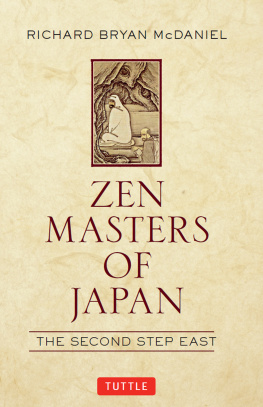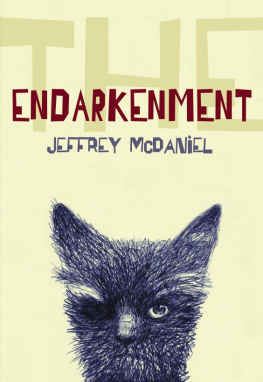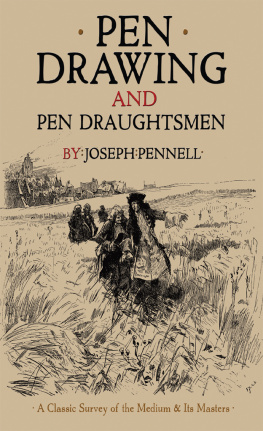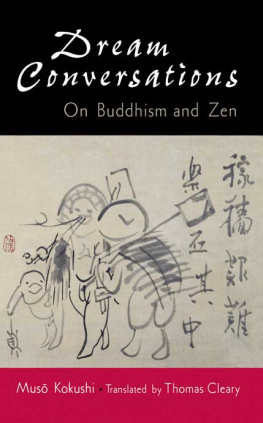Acknowledgments
The author gratefully acknowledges permission to reprint the following material:
Hackett Publishing Company for excerpts from: Stephen Addiss, Stanley Lombardo and Judith Roitman (eds.), Zen Source-book (2008.)
Excerpts from Zen Buddhism: A HistoryJapan by Heinrich Dumoulin World Wisdom, Inc, 2005. All selections used with permission.
The Rochester Zen Center for their translation of Master Hakuins Chant in Praise of Zazen .
Tuttle Publishing for excepts from Zen Flesh, Zen Bones by Paul Reps and Nyogen Senzaki, and An Introduction to Zen Training by Omori Sogen
Michael Gamer, Anne Watts, and Joan Watts for excerpts from: Zen Dust by Isshu Miura and Ruth Sasaki.
Excerpts from Essays in Zen Buddhism , copyright by D. T. Suzuki. Used by permission of Grove/Atlantic, Inc. Any third party use of this material, outside of this publication, is prohibited.
Seven lines by Keizin Jokin from The Light Inside the Dark by John Tarrant. Copyright 1998 by John Tarrant. Reprinted by permission of HarperCollins Publishers.
Ikkyu, excepts from Crow With No Mouth , versions by Stephen Berg. Copyright 1989, 2000 by Stephen Berg. Reprinted with the permission of The Permissions Company, Inc., on behalf of Copper Canyon Press, www.coppercanyonpress.org.


Bibliography
Addiss, Stephen and Stanley Lombardo and Judith Roitman (eds.). Zen Sourcebook . Indianapolis: Hackett Publishing Company, 2008.
Aitkin, Robert. Taking the Path of Zen . New York: North Point Press, 1982.
Berg, Stephen (trans.). Crow with No Mouth . Port Townsend, WA: Copper Canyon Press, 2000.
Braverman, Arthur (ed. and trans.). Warrior of Zen . New York: Kodansha International, 1994.
Cleary, Thomas [trans.]. Shobogenzo: Zen Essays by Dogen . Honolulu: University of Hawaii Press, 1992.
Cleary, Thomas. Timeless Spring . Rutland, VT: Tuttle Publishing, 1980.
Cleary, Thomas. The Undying Lamp of Zen . Boston: Shambhala, 2011.
Cleary, Thomas [trans. and edit]. Zen Antics , Boston: Shambhala, 1993.
Cook, Francis Dojun. How to Raise an Ox . Boston: Wisdom Publications, 2002.
Dumoulin, Heinrich. Zen Buddhism: A History India and China . Bloomington, IN: World Wisdom, 1988.
Dumoulin, Heinrich. Zen Buddhism: A History Japan . Bloomington, IN: World Wisdom, 1990.
Durant, Will. Our Oriental Heritage . New York: MJF Books, 1993.
Ferguson, Andy. Zens Chinese Heritage . Boston: Wisdom Publications, 2000.
Furuta, Shokin. Sengai: Master Zen Painter . New York: Kodansha International, 2000.
Hoover, Thomas. The Zen Experience . New York: New American Library, 1980.
Kraft, Kenneth (ed). Zen Teaching, Zen Practice . Boston: Weatherhill, 2000.
Kraft, Kenneth (ed.). Zen: Tradition and Transition . New York: Grove/Atlantic, 1988.
Low, Albert. Hakuin on Kensho . Boston: Shambhala, 2006.
Low, Albert. Zen Meditation Plain and Simple . Rutland, VT: Tuttle Publishing, 2000.
Matthiessen, Peter. Nine-Headed Dragon River . Boston: Shambala, 1998.
McDaniel, Richard Bryan. Zen Masters of China: The First Step East . Rutland, VT: Tuttle Publishing, 2012.
Miura, Isshu and Ruth Sasaki. Zen Dust . New York: Harcourt, Brace and World, 1966.
Nukariya, Kaiten. The Religion of the Samurai . New York: Taylor and Francis, 2005.
Omori Sogen. An Introduction to Zen Training. Rutland , VT: Tuttle Publishing, 2001.
Reps, Paul and Nyogen Senzaki. Zen Flesh, Zen Bones . Rutland, VT: Tuttle Publishing, 1998.
Rochester Zen Center. Chants and Recitations . Rochester: Rochester Zen Center, 2005.
Ryokan. One Robe, One Bowl: The Zen Poetry of Ryokan . Boston: Weatherhill, 2006.
Sekida, Katsuki. Two Zen Classics . Boston: Shambhala, 2005.
Senzaki, Nyogen. Eloquent Silence . Boston: Wisdom Publications, 2008.
Shodo Harada. The Path to BodhiDharma . Rutland, Vermont: Tuttle Publishing, 2000.
Snyder, Gary. Riprap and Cold Mountain Poems . Berkeley: Counterpoint, 2010.
Suzuki, D. T. Essays in Zen Buddhism, First Series . New York: Grove Press, 1994.
Suzuki, D. T. Essays in Zen Buddhism, Third Series . Newburyport, MA: Samuel Weiser, 1971.
Suzuki, D. T. Sengai: The Zen of Ink and Paper . Boston: Sham-bhala, 1999.
Suzuki, D. T. Zen and Japanese Culture . Princeton: Princeton University Press, 2010.
Suzuki, D. T. The Zen Doctrine of No-Mind . Newburyport, MA: Samuel Weiser, 1991.
Tames, Richard. A Travellers History of Japan . New York: Interlink Books, 2008.
Ueda, Makoto. The Master Haiku Poet Matsuo Basho . Tokyo: Kodansha International, 1982.
Victoria, Brian Daizen. Zen at War . Oxford: Rowman and Little-field, 2006.
Waddell, Norman. The Unborn: The Life and Teachings of Zen Master Bankei . New York: North Point Press, 1984.
Watts, Alan. The Way of Zen . New York: Vintage, 1999.

|
Landscape by Sesshu Toyo |
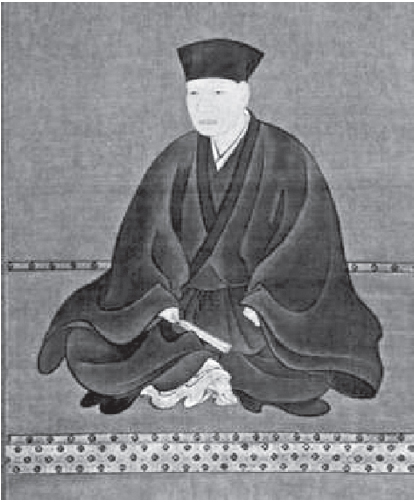
|
Portrait of Soeki Rikyu |
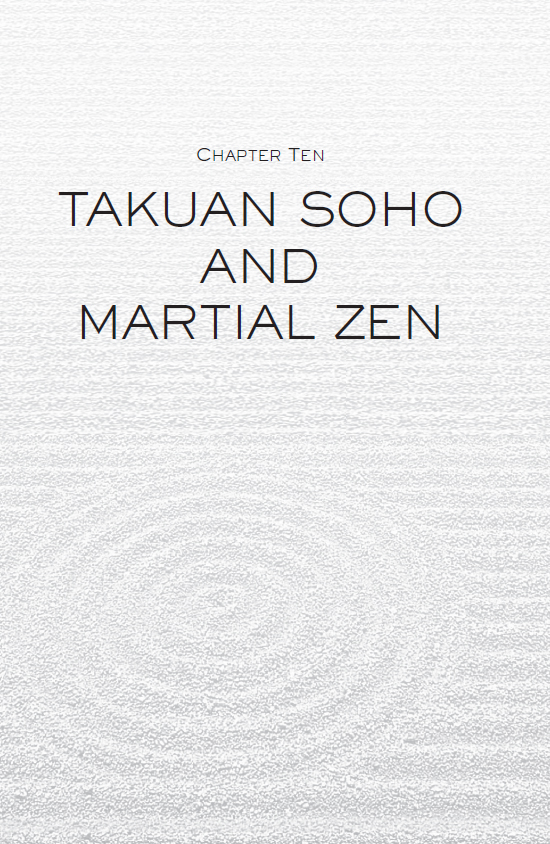
One third of D. T. Suzukis examination of the impact of Zen on Japanese culture deals with Zen and kendothe way of the sword. In that book, he relates a story about a tea-man, with no martial training, who was attached to the household of a provincial Daimyo. On a particular occasion, the Daimyo insisted that the tea master accompany him on a visit to the capital city, Edo; and, in order that he fit in with the other members of the entourage, he was instructed to dress like a samurai and to carry the two distinctive swords associated with the warrior class.
The tea master was self-conscious about appearing to be something he was not and generally stayed within the compound where they were lodged. However, one day he decided to take a walk to view the sights of the city. While doing so he was accosted by a ronin a masterless samurai. The ronin was a bully who could tell by the way the tea master carried himself that he was not a genuine samurai. He blocked the tea masters path and told him, I see by your dress that youre from the province of Tosa, which is famous for the skill their samurai have with the sword. I would be honored if you would let me test my talents against yours.
The tea-man replied, Im not, as you assume, a samurai at all. I have dressed like this at the command of my Lord. Im a master of chanoyu . I know nothing of sword play.
Then you have no right to carry that sword. But since you have done so, youll now have to use it regardless of how much or how little you know.
The tea master realized that honor required him to face the ronin , and he resigned himself to die in the encounter. However, he did not wish to make a complete fool of himself in the match, which would bring disgrace not only upon himself but upon his Daimyo as well. So he told the ronin , Very well, I will fight you. But at the moment, I am carrying out an errand on behalf of my master. Please allow me to complete it, and I will meet you at this time tomorrow to fulfill my obligation.

